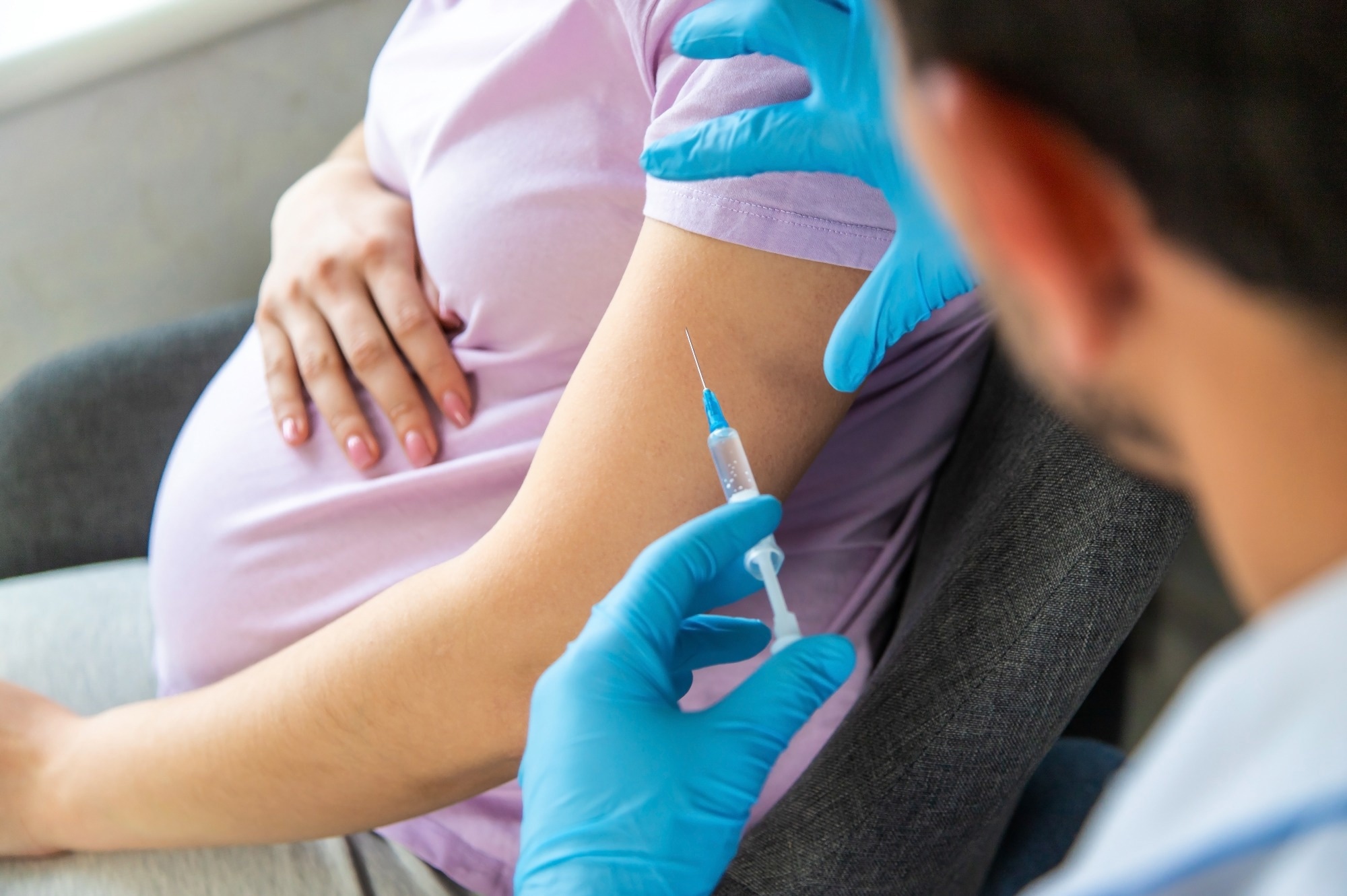In a recent study published in the journal Obstetrics & Gynecology, researchers evaluate the association between antenatal coronavirus disease 2019 (COVID-19) vaccination and adverse pregnancy outcomes.
 Study: Obstetric complications and birth outcomes after antenatal coronavirus disease 2019 (COVID-19) vaccination. Image Credit: Anuta23 / Shutterstock.com
Study: Obstetric complications and birth outcomes after antenatal coronavirus disease 2019 (COVID-19) vaccination. Image Credit: Anuta23 / Shutterstock.com
COVID-19 and pregnancy
Most individuals infected with the severe acute respiratory syndrome coronavirus 2 (SARS-CoV-2), the pathogen responsible for COVID-19, experience mild symptoms or remain asymptomatic throughout the infection. However, certain patient populations, such as older adults, those with certain comorbidities, and pregnant women, are at an increased overall risk of mortality and morbidity when infected with SARS-CoV-2. In pregnant women, COVID-19 increases the risk of cesarean delivery, hypertensive disorders of pregnancy (HDP), and preterm birth (PTB).
Despite being excluded from the initial clinical trials on COVID-19 vaccines, pregnant women were advised to be vaccinated against COVID-19. Soon after their approval and subsequent distribution to the public, messenger ribonucleic acid (mRNA) COVID-19 vaccines were found to significantly reduce the risk of COVID-19-related complications in both pregnant women and their infants during the first six months of life. Nevertheless, there remains a lack of data on how antenatal COVID-19 vaccination affects the risk of adverse pregnancy outcomes. To this end, the current study aimed to elucidate the association between antenatal vaccination and the risk of small-for-gestational-age (SGA) infants, PTB, gestational diabetes mellitus (GDM), and HDP including gestational hypertension, preeclampsia-eclampsia, and hemolysis, elevated liver enzymes, and low platelet count (HELLP) syndrome.
About the study
The current retrospective study included women who delivered live singleton babies between June 1, 2021, and January 31, 2022. Data were obtained from eight healthcare systems that were part of the Vaccine Safety Datalink (VSD), which links healthcare organizations to monitor vaccine safety in the United States.
Patients were categorized based on their vaccine history. This included controls and patients who received one or more doses of either the Pfizer-BioNTech or Moderna mRNA COVID-19 vaccines during pregnancy who were placed in the vaccine exposure cohort.
What did the study show?
The study included 55,691 women, 42.3% of whom received one or two primary series of the mRNA COVID-19 vaccine doses during pregnancy. Study participants were more likely to be vaccinated if they were older, as they had a mean age of 31.7 years as compared to non-vaccinated study participants with a mean age of 29.6 years. Moreover, vaccinated women were more likely to be non-Hispanic Asian and less likely to be Hispanic or non-Hispanic Black. Neighborhood poverty was also lower among vaccinated study participants.
Women who received the vaccine during pregnancy had a lower risk of 6.4% of PTB before 37 weeks of gestation compared to 7.7% among unvaccinated women. However, receipt of an mRNA COVID-19 vaccine did not appear to impact the risk of PTB when vaccine exposure by pregnancy trimester was considered. COVID-19 vaccination did not increase or decrease the risk of SGA infants, GDM, HDP, including HELLP syndrome, or gestational hypertension.
Previous studies have shown that the risk of adverse outcomes for both mothers and infants due to moderate to severe COVID-19 is significantly less after one or two antenatal doses of an mRNA vaccine. Likewise, the current study reported that the risk of severe COVID-19 was reduced by 74% and 90% after one and two vaccine doses, respectively.
Conclusions
Receipt of an mRNA COVID-19 vaccine during pregnancy was not associated with an increased risk of adverse pregnancy outcomes.”
Some notable strengths of the current study include the large cohort of individuals with diverse racial, ethnic, and geographic backgrounds, thorough analysis of obstetric complications and birth outcomes, as well as the inclusion of first trimester COVID-19 vaccination records.
Importantly, some limitations of this study include the lack of data on COVID-19 diagnoses that did not require medical attention and the inclusion of vaccinated individuals before becoming pregnant. Furthermore, only women with live births who had health insurance were included in the study, which may limit the generalizability of the findings.
Taken together, the study findings validate previous reports confirming the safety of mRNA COVID-19 vaccination during pregnancy.
Journal reference:
- Vesco, K., Deniable, A. E., Lipkind, H. S., et al. (2024). Obstetric complications and birth outcomes after antenatal coronavirus disease 2019 (COVID-19) vaccination. Obstetrics & Gynecology. doi:10.1097/AOG.0000000000005583